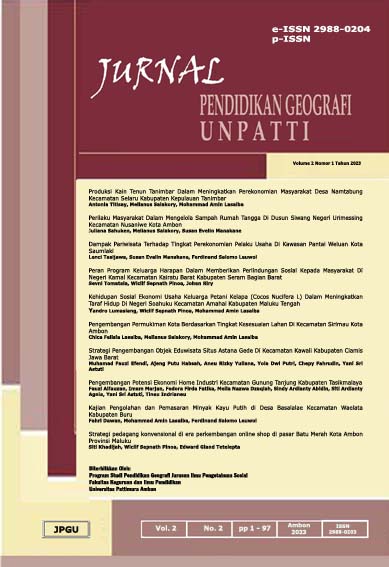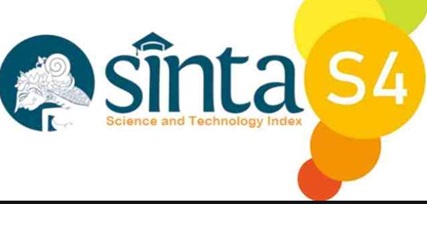Community-Based Tsunami Disaster Risk Management in Ambon City
Manajemen Risiko Bencana Tsunami Berbasis Masyarakat di Kota Ambon
Abstract
Community-based disaster risk management is used in reducing disaster risk and improving community resilience to tsunamis. This research was conducted in Ambon City which is a very vulnerable area of tsunami disaster. shown based on historical data. The method of collection used is secondary data with survey techniques using analytical techniques using content analysis. The results of the study showed that Ambon City Government had prepared itself by forming safety-conscious community groups in tackling tsunami threats and the level of recative community-based disaster risk management is quite good. Tsunami disaster risk management actions have been done in collaboration with related agencies such as BNPB, LIPI of Ambon City Government and research institutions from home and abroad.
Downloads
References
Abenir, M. A. D., Manzanero, L. I. O., & Bollettino, V. (2022). Community-based leadership in disaster resilience: The case of small island community in Hagonoy, Bulacan, Philippines. International Journal of Disaster Risk Reduction, 71, 102797. https://doi.org/10.1016/j.ijdrr.2022.102797
Behrens, J., Løvholt, F., Jalayer, F., Lorito, S., Salgado-Gálvez, M. A., Sørensen, M., Abadie, S., Aguirre-Ayerbe, I., Aniel-Quiroga, I., Babeyko, A., Baiguera, M., Basili, R., Belliazzi, S., Grezio, A., Johnson, K., Murphy, S., Paris, R., Rafliana, I., De Risi, R., … Vyhmeister, E. (2021). Probabilistic Tsunami Hazard and Risk Analysis: A Review of Research Gaps. Frontiers in Earth Science, 9. https://doi.org/10.3389/feart.2021.628772
Georg Everhard Rumphius. (1675). History of the Terrible Earthquake that Took Place Recently, and Some Time Before, but Principally on February 17, 1674 in and around the Island of Amboina.
Hamzah, D. A. (2021). Metode Penelitian Kualitatif Rekontruksi Pemikiran Dasar serta Contoh Penerapan Pada Ilmu Pendidikan, Sosial & Humaniora. CV Literasi Nusantara Abadi.
Husein, R. (2022). Localizing disaster risk reduction: a case study of community-based disaster preparedness in Bima and Palangkaraya Indonesia. {IOP} Conference Series: Earth and Environmental Science, 989(1), 12027. https://doi.org/10.1088/1755-1315/989/1/012027
Indah Kurniawati, & R. M. R. (2021). Teknik Pembuatan Peta Evakuasi Tsunami Negeri Galala & Hative Kecil, Kota Ambon. Prosiding Simposium Nasional Kelautan Dan Perikanan, 225–231.
Kamigaichi, O. (2022). Tsunami Forecasting and Warning BT - Complexity in Tsunamis, Volcanoes, and their Hazards (R. I. Tilling (ed.); pp. 335–371). Springer US. https://doi.org/10.1007/978-1-0716-1705-2_568
Lasaiba, M. A. (2016). Dimensi Spasial Karakteristik Sebaran Dan Deviasi Pola Pegunungan Lahan Terhadap Ekosistem Pesisir Di Kota Ambon. Jendela Pengetahuan, 9(1), 24–34.
Lasaiba, M. A., & Arfa, H. (2022). Spatial Distribution Of The Earthquake Episentrum Based On Geographic Information System ( Gis ) On Ambon Island. Jurnal Tunas Geografi, 11(1), 37–46. https://doi.org/https://doi.org/10.24114/tgeo.v11i1.34931
Lasaiba, M. A., & Saud, A. W. (2022). Pemanfaatan Citra Landsat 8 Oli/Tirs Untuk Identifikasi Kerapatan Vegetasi Menggunakan Metode Normalized Difference Vegetation Index (Ndvi) Di Kota Ambon. JURNAL GEOGRAFI. Geografi Dan Pengajarannya, 20(1), 53–65. https://doi.org/https://doi.org/10.26740/jggp.v20n1.p53-65
Latief. H, Kodijat. A, Ismoyo. D, Bustamam. B, Adyasar. D, N. N. dan R. (2016). Air Turun Naik di Tiga Negeri. United Nations Educational, Scientific, and Cultural Organization, Office Jakarta - Indian Ocean Tsunami Information Centre.
Pranantyo, I. R. (2019). Tsunami hazard in Eastern Indonesia: Source identification and reconstruction for historical case studies. Australian National University.
Sharma, S., Kumar, V., & Saruchi. (2022). Community approach toward disaster resilience. In Cognitive Data Models for Sustainable Environment (pp. 125–161). Elsevier. https://doi.org/10.1016/B978-0-12-824038-0.00003-1
Susiloningtyas, D., Lestari, D. A., & Supriatna, S. (2020). Pemodelan Spasial Peak Ground Acceleration dan Prediksi Luas Genangan Tsunami di Kota Bengkulu. Majalah Geografi Indonesia, 34(2), 166. https://doi.org/10.22146/mgi.44168
U.S. Geological Survey. (2019). Earthquake Catalog. USGS Website.
Yusuf, R., Yunus, M., Maimun, M., & Fajri, I. (2021). Environmental Education: A Correlational Study among Environmental Literacy, Disaster Knowledge, Environmental Sensitivity, and Clean-Living Behavior of Post Tsunami Disaster in Aceh Communities, Indonesia. Polish Journal of Environmental Studies, 31(1), 411–425. https://doi.org/10.15244/pjoes/139327














